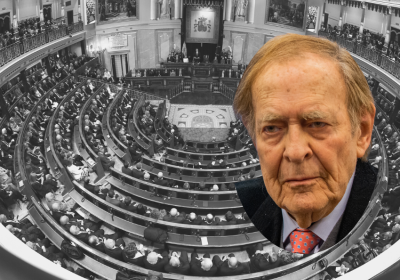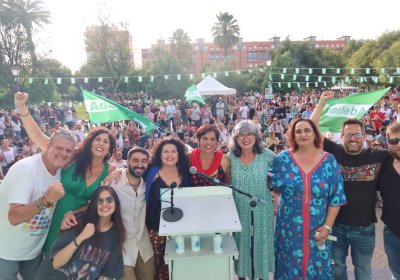Green Left's European correspondent Dick Nichols analyses the July 23 Spanish general election.
Unidas Podemos (UP)
The far right were the big winners in the Spanish local elections, reports Dick Nichols, and Prime Minister Pedro Sanchez is seeking to minimise the damage by calling a general election as early as July 23.
The Spanish far-right's latest attempt to censure prime minister Pedro Sanchez' government — with the help of a former leader of the Communist Party of Spain — has backfired, writes Dick Nichols.
NATO’s hawkish Madrid meeting booked the political benefits from Putin’s Ukraine invasion to the account of the imperialist power that stood to gain most from it — the US, reports Dick Nichols.
The landscape after the parliamentary election in Andalusia looks bleak. But, Dick Nichols argues, that hidden beneath the dark statistics, a seed of hope germinated.
Pablo Iglesias’s plan for the left to win the Madrid elections was simple: to inspire the workers and poor of the region surrounding the Spanish capital to vote, writes Dick Nichols.
Unidas Podemos is engaged in a thuggish operation against members of the Forward Andalusia coalition, writes Dick Nichols.
By the narrowest of margins (167 votes to 165 with 18 abstentions), the 350-seat Spanish Congress invested a coalition government of the social-democratic Spanish Socialist Workers Party (PSOE) and the more radical Unidas Podemos (UP) on January 7.
No Spanish prime minister has ever been elected by so low and so close a vote: eight of the parliament’s eighteen parties voted in favour, eight against and two abstained.
On November 12, largely in reaction to the rise of the right-wing Vox, Socialist Workers' Party leader Pedro Sánchez and Unidas Podemos' Pablo Iglesias stitched up a pre-agreement for government in less than 48 hours, writes Dick Nichols.
Spain’s acting Prime Minister Pedro Sánchez, leader of the Spanish Socialist Workers’ Party (PSOE) and winner of the April 28 general election, informed King Philip on September 17 that he lacked the support to form a government. As a result, another general election will be held on November 10.
At the June 8 ceremonial handing over of portfolio briefcases from outgoing conservative People’s Party (PP) ministers to their incoming Spanish Socialist Workers’ Party (PSOE) replacements, the contrasts were dramatic.
A bunch of reactionary lifetime political operators and religious obscurantists were replaced by what new Prime Minister Pedro Sánchez boasted was the “progressive”, “feminist” and “Europeanist” alternative.










